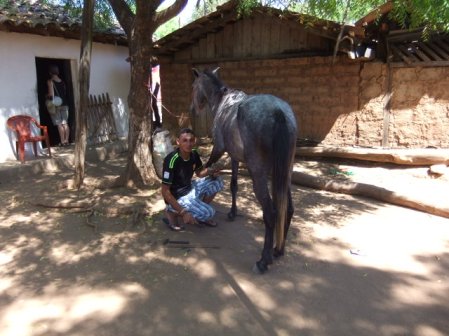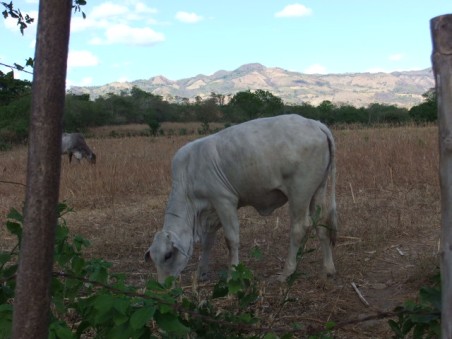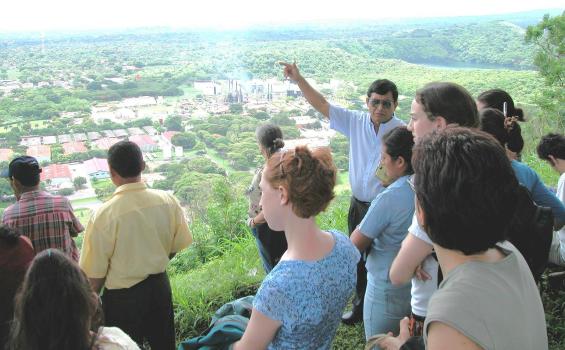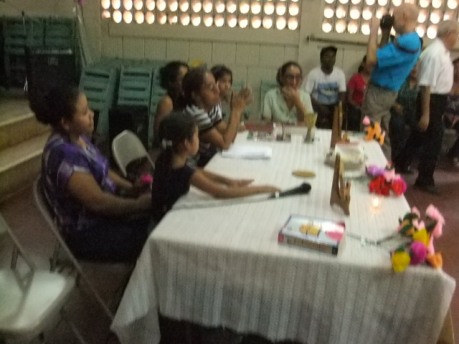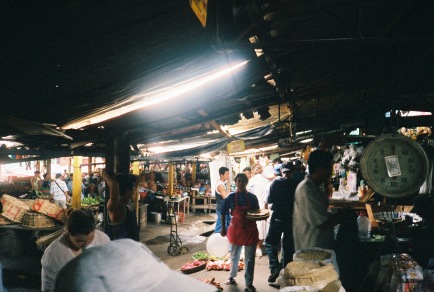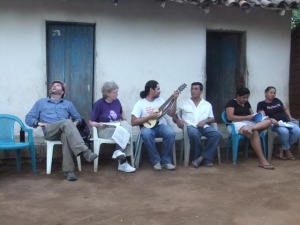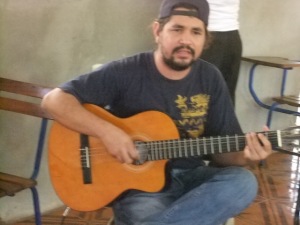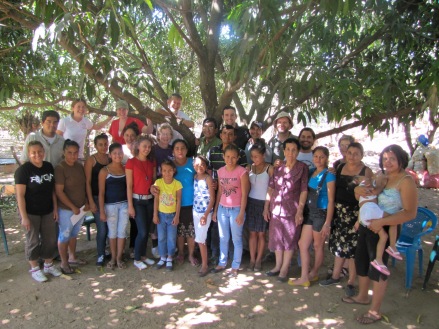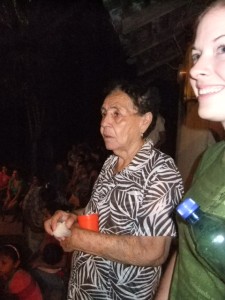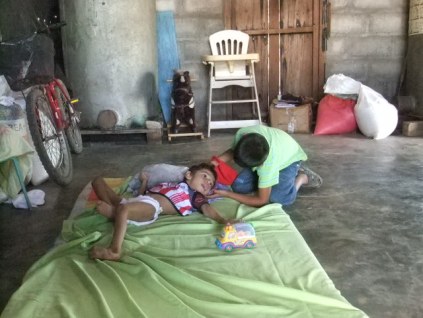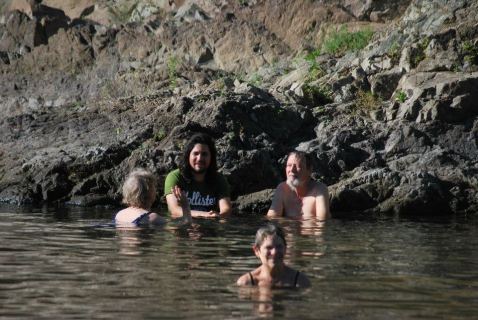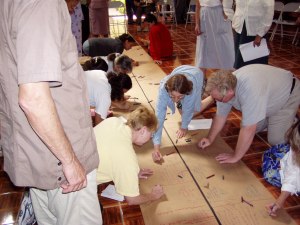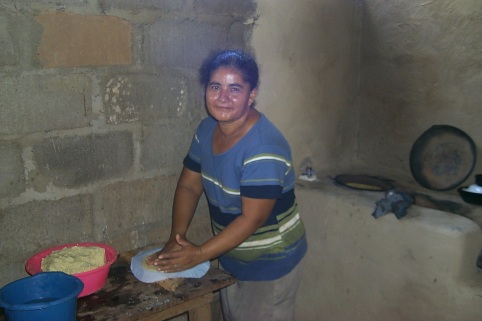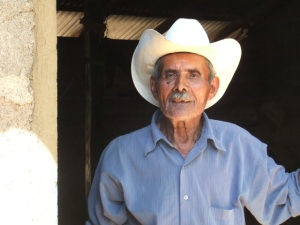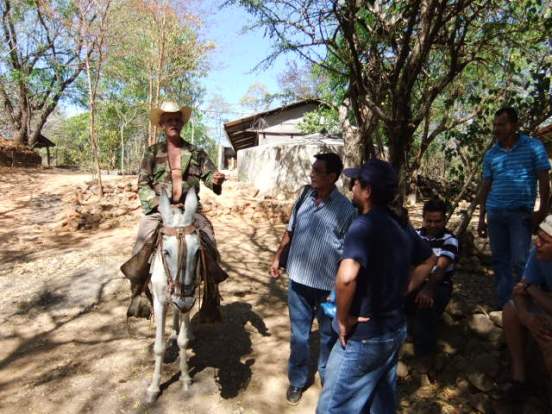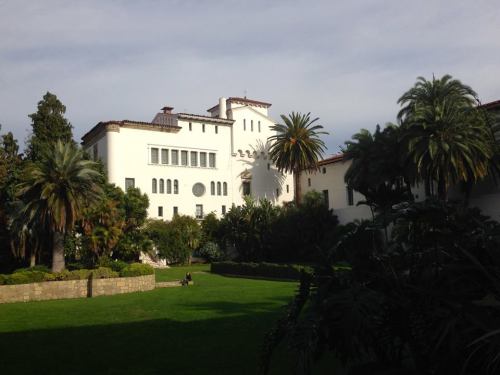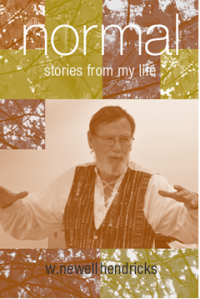It’s been awhile since I have posted anything. In that time I went to Nicaragua with 17 members of my family, and when I returned, decided to enter hospice care. The treatments were no longer effective and going to the hospital for any kind of visit seemed less and less desirable I am now comfortably situated in my home, have frequent visitors, and a very supportive church and hospice staff taking care of me.
In the mean time, here is a report back from our trip to Nicaragua
January 23 to Feburary 1, Seventeen members of my extended family went with me to say good-bye to all of my friends in Nicaragua, especially those who live in the community of Dulce Nombre de Jesus. I don’t have the energy to give a good report, so I asked some of the other members of the delegation if they might write about some special memory from the trip. Here is a general outline of the trip followed by some of these reflections:
We gathered in the church to meet one another
![1780815_630582343733875_8168721594944741272_n[1]](https://newellhendricks.files.wordpress.com/2015/02/1780815_630582343733875_8168721594944741272_n1.jpg?w=651&h=432)
We had several dialogues with the community about “family.”
![10959537_630582843733825_965665125459912740_n[1]](https://newellhendricks.files.wordpress.com/2015/02/10959537_630582843733825_965665125459912740_n1.jpg?w=651&h=432)
![10982356_630586750400101_1077758192874560280_n[1]](https://newellhendricks.files.wordpress.com/2015/02/10982356_630586750400101_1077758192874560280_n1.jpg?w=651&h=432)
We participated in the daily life of the community
![10930550_630583883733721_4293674750873485488_n[1]](https://newellhendricks.files.wordpress.com/2015/02/10930550_630583883733721_4293674750873485488_n1.jpg?w=649&h=431)
![10570536_630585693733540_4796989165675419180_n[1]](https://newellhendricks.files.wordpress.com/2015/02/10570536_630585693733540_4796989165675419180_n1.jpg?w=647&h=429)
![10417739_630587543733355_9176083187563596977_n[1]](https://newellhendricks.files.wordpress.com/2015/02/10417739_630587543733355_9176083187563596977_n1.jpg?w=651&h=425)
We worshiped together
Entre Culturas, the organization that facilitated the trip, showed us all the documentary they had just finished, on the history of the faith community – a special community which was part of the “Delegate of the Word” movement after Vatican II.
![10981818_630587133733396_7408122521703586477_n[1]](https://newellhendricks.files.wordpress.com/2015/02/10981818_630587133733396_7408122521703586477_n1.jpg?w=658&h=437)
![14354_630589030399873_4352763601101722257_n[1]](https://newellhendricks.files.wordpress.com/2015/02/14354_630589030399873_4352763601101722257_n1.jpg?w=657&h=436)
We had a party. They always celebrate my birthday, no matter when I come.
![10984081_630589710399805_1806416840939329978_n[1]](https://newellhendricks.files.wordpress.com/2015/02/10984081_630589710399805_1806416840939329978_n1.jpg?w=660&h=438)
We gathered one last time before getting on the bus.
![10958932_630590777066365_3306754427742269048_n[1]](https://newellhendricks.files.wordpress.com/2015/02/10958932_630590777066365_3306754427742269048_n1.jpg?w=656&h=435)
We spent two days in a retreat center near Masayya reflecting on our experience..
![1978819_630591643732945_3767656050131734284_n[1]](https://newellhendricks.files.wordpress.com/2015/02/1978819_630591643732945_3767656050131734284_n1.jpg?w=655&h=434)
Those who went on the delegation:
Newell Hendricks, Barbara Englesberg and daughter Anna Hendricks.
From Barbara’s family: her brother Paul Englesberg and wife, Lucy Morce; their son, Colin and his partner Kiana and their son Savion. Barbara’s sister, Helen Englesberg also came.
On my brother’s side of the family, his wife, Jane; Harmony and 14 year old Moxie and 13 year old Gus, plus the youngest daughter and family, Heidi and husband Todd: 5 year old Max and 3 year old Opie (Penelope). That made 17 in all: 6 from my generation: 6 from our daughter’s generation, and 5 from the youngest generation.
I asked several members to write their about one special event on that remembered from the trip. Here are some of those comments:
Lucy Morse:
A refrain echoes in my ears and heart – all day, even when I wake up during the night: “La paz, la paz es fruto de la justicia, el don de dios que debemos aceptar.” Even if my memory of the words isn’t exactly correct, I’m grappling with the profundity of its meaning. I feel its relationship to Newell’s connections with Dulce Nombre de Jesus and the work of Entre Culturas so strongly. It’s an entryway into my own experience of the past ten days in Nicaragua. The problem so far is that I’m not sure where that entryway goes or what my path is beyond it.
Our bus lurched down the rutted road into the center of the village where we were to join the community of La Iglesia de los Pobres for four days. I had no idea what to expect or what to do. The first thing I saw was a group of people waiting for us eagerly and smiling. When I finally got off the bus, I was greeted with a full-body hug from a woman I’d never met who clearly was welcoming me with all her heart. The crowd slowly moved us, hugging all the way, toward the church, a one room, open to the air tiled floor space. Simple and elegant. I saw my son going up to people and greeting each one. I liked his initiative and followed his lead into the church where white plastic chairs lined all the walls. As the community found chairs, I continued around the sanctuary greeting everyone. Some of the kids seemed surprised that I was greeting them, but they all got up and gave me a hug. As I reached the back corner of the church I found an empty seat and took it, not realizing that my entire family was seated across from me. We smiled at each other.
Suddenly the church erupted in song. Everyone, it seemed, sang full-throatedly and open-heartedly. I had never before been so thoroughly surrounded, wrapped and held by such heartfelt singing. Such a welcome! Such an invitation! It opened my own heart to the community. As I began to learn the lyrics and their meanings of liberation, community, responsibility and justice my heart continued to open.
I stepped through the entryway of that gathering into our host family’s circle, the workshops on family that were so skillfully led by Entre Culturas’ facilitators, swimming with the community’s kids in the river….and singing- that whole-hearted, all-inclusive singing.
By the way, our 2 ½ year old grandson knew just what to do in the church. Almost immediately he joined the community’s young kids who were sitting together on the floor in the raised area behind the altar. He seemed not quite sure what to do once he got there, but he knew he belonged with them. The community was saying to us at the same time: “You belong with us.” So it began.
Thank you to the staff of Entre Culturas for so thoroughly supporting us and the community in this delegation.
At one point Newell pointed out that one aspect of our delegation was simply to accompany the community in their process, not to project our own ideas of what they are doing or what we think they could be doing. That simple, profound experience of being with the community became my touchstone. I return to it often; I will work to carry some of its import into my daily life.
Lucy Morce
—————-
Barbara Englesberg
One of the many memorable experiences I had in Dulce Nombre de Jesus was the church service on the last day. It was a thrill for me to be able to join the great accordion player, Secundino, and his guitarist son, Everth. on my violin, accompanying some of the hymns of the Church of the Poor. With generous smiles and encouraging previews of each song they performed the music robustly, while I joined in as best I could with harmony or melody. Their spiritual energy and love for the music was very contagious. After the service I let some of the children try my violin. Some were eager, others were too shy. One little boy, Kenyer, who had been bullied in the village, had been watching me with rapt attention. When I let him try the violin he enjoyed playing with great gusto. It was very gratifying for me to actively
participate in music-making and to be able to introduce these children to the violin. I am grateful that I was able to experience the spiritual joy of this community, as well as that of Catorce de Setiembre, and the powerful ways in which this joy is expressed through music.
Harmony Hendricks:
Thanks to Newell for preparing us with a history lesson so that I could appreciate Memo’s pride as we toured Managua. Seeing and having a little knowledge of a people so close to their own revolution and reformation is a gift of inspiration, and Memo’s pride and generosity teaching it are a gift also.
Newell asked me to thank Gloria the first day under the mango tree, which I did not do, can’t imagine why not now, but written on the back of my song book is this- “Thanks to Gloria for feeding and caring for my mother while she lives in your home, for feeding and caring for this amazing tree so that we all may find shelter here, for the coffee for my sulky son, for all the people here for making a place where we can all be together, and for the remarkable Nica trait of unending generosity.
The thing I keep telling people about over and over is the music, the singing coming from the windows of the church. I do it no justice, I can’t tell how the voices of the women sound, how the kids smiled at us, how I spilt my baggie of orange juice, how delicious the food was, my friends don’t really understand, but it makes me grin every time, so maybe I’m telling the story of the music coming from the windows of the church to myself. I will continue to do so.
I keep thinking about the first day when we got there and they sung us into town and I was nervous and uncomfortable, we are all bunched together, hot, intimidated,and in no way at home, and then, only four days later, we are scattered all over the church, laughing and relaxed and I wasn’t in someone else’s church at all. And we all sang us out of town together. That’s an incredible piece of work, you should be very proud of that.
This is the letter I wrote when you asked us to write about our experiences to someone back home.
Dear Newell,
I am cheating, writing to you, who know better than anyone what it means to be here, and you already know the meaning of the word “delegation,” (I still do not). I went to Nicaragua and sang songs in a language I did not understand to a God with whom I have no relationship, and it turns out that the words do not matter, and the relationship may, or may not matter either, at least in the ways I thought.
I once called you to ask your advice on sending my kids to the local church to get a little religious teaching, and you asked no questions about what they taught, what the did in the community, who they were, what roll they played in town, the only thing you asked me was if I would go with them. No, I said, for reasons of my own, and with no other discussion you said “Absolutely not, family is the most important thing, if you don’t go as a family you don’t go period.”
So I come to your church, in Nicaragua, with my family, and I am so grateful to have done so. I came because my father told me to, in the months since he died I’ve heard his voice over and over telling me to not pass this up, don’t let this one get by you, in my words, you gotta show up.
What did I learn? Snap out of it! There’s songs to sing. You must be present to win.
What I got in Nicaragua is my first time showing up in seven months, I went looking for my father and I found you.
I can’t tell you all how much I appreciate you and what you did for us.
Harmony
————–
Newell Hendricks
As we pulled up to the church in the town square, we could see the crowd gathered. Most of my family was on the bus. I was in the front seat of the truck so I could put the seat way back and lean against several pillows. The windshield was dirty, so people couldn’t see into the truck very well, but then a young girl pointed at me and shouted and started jumping up and down. I got out and was surrounded by the wonderful people of Dulce Nombre de Jesus. I had no words, only tears. As I hugged people, I tried to say their name, probably making many mistakes, but they embraced me nevertheless. Eventually we entered the church and there was a chance to talk. All I could say was “si trato de hablar, voy a llorar.” It was the same at every gathering that week. I had come back one last time to Nicaragua to say good-bye, but I didn’t know what else to say, or even to feel. I was simply there, and had brought my family. I had no special words to summarize what the relationship had meant to me over the years – I couldn’t explain to the community why I had brought my family, and I couldn’t explain to my family why I had asked them to come. I actually had no expectations for the trip. The last four months, my sole job was to stay alive and healthy enough to travel to Nicaragua. I left it to others, to my family and to Entre Culturas and to the good people of Dulce Nombre to figure out what we would do or say once we were together. And now that it has happened, I have very few words to express what happened. But it happened. The theme for the trip became “just show up.” I showed up, my wife and daughter showed up, my extended family showed up, Entre Culturas showed up, and so did the people of Dulce Nombre de Jesus.
I still have no words. I have gratitude in my heart and music in my ears and the memory of smiles of family and friends as they watched this process of everyone just showing up and being together. It was a great act of faith on a lot of people’s parts. There must have been some visioning on my part, but that was long enough ago that it has long since escaped my awareness.
I am home now, and enjoying all of the memories, but unable to put it all together with any kind of meaningful perspective. So I will simply repeat my description of this one scene, of a truck with a dirty windshield pulling up to a crowd outside a church, all squinting to see who was in the truck – and then a little girl pointing and jumping up and down, and everyone rushing over and hugging and me just crying.
Newell

![1780815_630582343733875_8168721594944741272_n[1]](https://newellhendricks.files.wordpress.com/2015/02/1780815_630582343733875_8168721594944741272_n1.jpg?w=651&h=432)
![10959537_630582843733825_965665125459912740_n[1]](https://newellhendricks.files.wordpress.com/2015/02/10959537_630582843733825_965665125459912740_n1.jpg?w=651&h=432)
![10982356_630586750400101_1077758192874560280_n[1]](https://newellhendricks.files.wordpress.com/2015/02/10982356_630586750400101_1077758192874560280_n1.jpg?w=651&h=432)
![10930550_630583883733721_4293674750873485488_n[1]](https://newellhendricks.files.wordpress.com/2015/02/10930550_630583883733721_4293674750873485488_n1.jpg?w=649&h=431)
![10570536_630585693733540_4796989165675419180_n[1]](https://newellhendricks.files.wordpress.com/2015/02/10570536_630585693733540_4796989165675419180_n1.jpg?w=647&h=429)
![10417739_630587543733355_9176083187563596977_n[1]](https://newellhendricks.files.wordpress.com/2015/02/10417739_630587543733355_9176083187563596977_n1.jpg?w=651&h=425)
![10981818_630587133733396_7408122521703586477_n[1]](https://newellhendricks.files.wordpress.com/2015/02/10981818_630587133733396_7408122521703586477_n1.jpg?w=658&h=437)
![14354_630589030399873_4352763601101722257_n[1]](https://newellhendricks.files.wordpress.com/2015/02/14354_630589030399873_4352763601101722257_n1.jpg?w=657&h=436)
![10984081_630589710399805_1806416840939329978_n[1]](https://newellhendricks.files.wordpress.com/2015/02/10984081_630589710399805_1806416840939329978_n1.jpg?w=660&h=438)
![10958932_630590777066365_3306754427742269048_n[1]](https://newellhendricks.files.wordpress.com/2015/02/10958932_630590777066365_3306754427742269048_n1.jpg?w=656&h=435)
![1978819_630591643732945_3767656050131734284_n[1]](https://newellhendricks.files.wordpress.com/2015/02/1978819_630591643732945_3767656050131734284_n1.jpg?w=655&h=434)
![beloved_brews_faithbarista_badge[1]](https://newellhendricks.files.wordpress.com/2015/01/beloved_brews_faithbarista_badge1.png?w=640)
